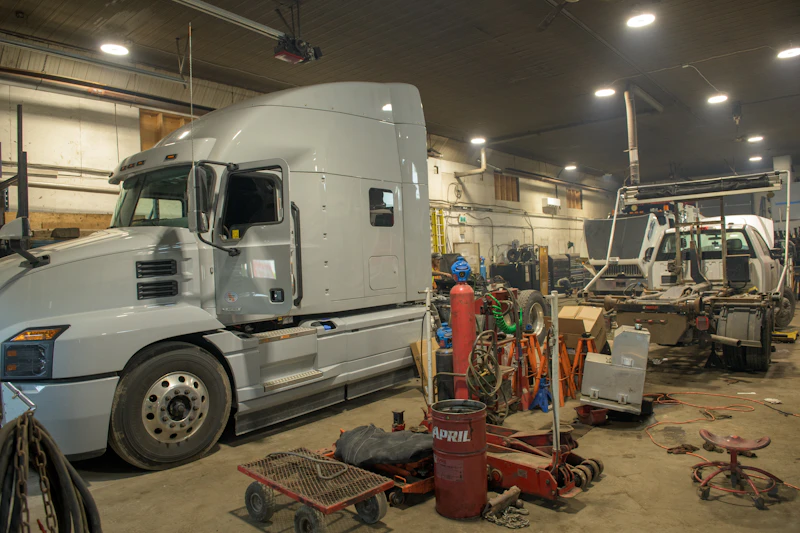7 Myths and Misconceptions About Diesel Truck Repairs

Myths and misconceptions are rife in every walk of life, including in the heavy-duty diesel industry. Just because someone at a truck stop once told you that something is true doesn’t actually mean it is. Although some may be harmless nonsense, others, if believed, can actually harm your vehicle and your operations.
But how can you separate fact from fiction? Well, we have the answer. Just keep reading this page, where we dispel seven diesel truck repair myths and offer you some practical advice to benefit your business!
Myth 1: Diesel Engines are Too Expensive to Repair
Fact Check
A common misconception is that diesel engines are inherently more expensive to repair than their gasoline counterparts. While diesel engine parts can be pricier, their robustness and longer lifespan often mean that overall maintenance costs are generally lower over the vehicle's life.
Practical Advice
Regular maintenance is key to avoiding costly repairs. Diesel engines require meticulous care, but with the right approach, their longevity and efficiency can significantly outweigh initial costs.
A diesel truck maintenance checklist should include regular oil changes, fuel filter replacements, and air filter checks. Regularly hiring professionals to service your engine can prevent minor issues from escalating into major expenses.
Myth 2: Diesel Fuel is Always Cheaper and More Efficient
Fact Check
Although diesel fuel has historically been cheaper than gasoline, prices fluctuate due to market demand and geopolitical factors, and at the time of writing, prices are on the rise. While diesel engines are often more fuel-efficient, this can vary depending on the load and driving conditions. A gasoline engine that is subject to best driving practices on a flat highway is going to be far more efficient than a diesel engine whose driver is aggressively driving off-road.
Practical Advice
Regular maintenance and correct driving practices can improve fuel efficiency. For instance, maintaining proper tire inflation and ensuring your engine is properly tuned can make a huge difference in fuel consumption.
Myth 3: Diesel Trucks Don’t Need as Much Maintenance as Gasoline Trucks
Fact Check
If you’re going to remember only one of these today, then please let it be this one.
The belief that diesel trucks require less maintenance is a dangerous myth. Diesel engines have specific maintenance needs that, if neglected, can lead to significant issues down the line, including costly repairs, extended downtime, and safety concerns.
Practical Advice
Regular checks and balances are crucial. Monitoring oil levels, air filters, and coolant systems regularly can save you from unexpected breakdowns and repairs.
Myth 4: Any Mechanic Can Repair a Diesel Engine
Fact Check
Diesel engines require specialized knowledge and tools for proper maintenance and repair. Not all mechanics are equipped or trained to handle the complexities of diesel technology. In the same way, not all automotive mechanics can repair motorcycles; just because they know how to repair a gasoline engine doesn’t mean they can do the same with a diesel one.
Practical Advice
When selecting a repair shop, ensure they have certified diesel technicians. Their specialized expertise is crucial for diagnosing and fixing problems accurately and efficiently. The more qualifications among their team, the better, especially if they have ones focused on specific engine manufacturers.
Myth 5: Older Diesel Engines Are as Efficient as New Ones
Fact Check
Advancements in diesel technology have significantly improved performance and efficiency. Older engines, while durable, cannot match the efficiency and environmental standards of modern diesel engines.
Practical Advice
Consider retrofitting older engines with new technology to improve efficiency. Or upgrading to a newer model, which is more cost-effective and environmentally friendly in the long run.
Myth 6: Diesel Engines Are Bad for the Environment
Fact Check
Modern diesel engines are designed with the environment in mind. Advances in technology have greatly reduced emissions, making them much cleaner than older models. The mandatory inclusion of DPF systems to further help reduce emissions has seen diesel engines become a greener option over the past few years.
Practical Advice
Maintaining your emission control systems is essential for keeping your diesel engine running cleanly. Regular checks ensure these systems function correctly, reducing your environmental footprint. Not meeting your emissions targets can see you slapped with a fine in excess of $45,000 per non-compliant vehicle.
Myth 7: Restarting a Diesel Engine Uses More Fuel Than Idling
Fact Check
Idling a diesel engine for long periods of time is less fuel-efficient than turning it off and restarting it. This myth is based on outdated practices and does not hold true with modern diesel technology.
Practical Advice
Implementing a smart idling policy can save significant amounts of fuel. Educating drivers on the benefits of turning off engines during prolonged stops can lead to cost savings and reduced wear on the engine.
Practical Tips for Diesel Truck Maintenance
Preventive Maintenance
The importance of regular inspections and adhering to a maintenance schedule cannot be overemphasized. It's the best way to ensure the longevity and reliability of your diesel truck.
Diagnosing Problems
Early detection of issues is vital. Being familiar with common diesel engine problems and their signs can help prevent small issues from becoming major ones.
Finding the Right Parts
Using high-quality or OEM (Original Equipment Manufacturer) parts for repairs ensures compatibility and reliability. While aftermarket parts can be cheaper, they may not always meet the stringent standards required for optimal engine performance.
Final Thoughts
So there you have it; the next time someone tells you that diesel engines are bad for the environment, you can tell them that they’re talking complete nonsense.
In all seriousness, though, now that you’re armed with the right information, you can make informed decisions about your maintenance routines. This can help ensure that your operations move forward smoothly and contribute to safer roads and a cleaner environment.


.webp)
.webp)